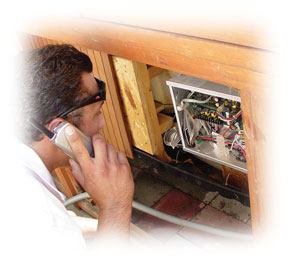Thousands of Texas service technicians have been operating illegally since March 1, and many are unaware of this fact.
This year, the Texas Department of Licensing and Regulation began requiring all service techs to pass a licensing exam based on the 2008 National Electrical Code handbook. Techs who remain unlicensed may be subject to heavy fines or even closure.
“TDLR could start enforcing this at any time,” said Kevin Tucker, information officer at the Aquatic Professionals Education Council, a statewide pool and spa industry advocacy group. “[We’re] trying to convince them that … we want to be in compliance.”
This cooperation is especially crucial in light of past friction between TDLR and the industry. Several years ago, TDLR organized sting operations in several cities, springing $500 fines on unlicensed service techs. Though these stings were targeted at flagrant abusers of the system, rumors of the fines spread quickly, giving rise to fear and distrust of the board among many legitimate business owners.
But that’s all in the past, Tucker said. Over the last few years, APEC has been working hard to emphasize the importance of compliance throughout the state. And TDLR officials have agreed to hold off on enforcing the regulations until more techs have had time to study and pass the test.
“They told us they weren’t going to actively go after the pool and spa business unless there was a specific complaint,” Tucker said. “They have indicated they’re not going to be pushing hard to enforce it … until we have time to get people licensed.”
However, the clock is ticking. That’s why organizations such as the Independent Pool & Spa Service Association and the Association of Pool & Spa Professionals have been hustling to alert their members.
“We’ve been letting people know,” said Douglas Dinkins, president of the Aquatic Professionals Education Council. “The problem is, not everybody goes to an IPSSA or APSP meeting. … Some people don’t get trade magazines. Some still don’t use e-mail at all. So they’re not informed.”
The licensing issue’s roots reach back to 2003, when TDLR adopted the National Electrical Code as its licensing standard. Under this code, anyone performing any type of electrical work must be a state-certified electrician, which means passing an exam based on the NEC handbook. Because the exam devoted only a single section to pool and spa equipment, many service techs openly expressed frustration with the certification process, and some avoided taking the test altogether.
During these initial tensions, TDLR began executing stings in a few cities around Texas. When the licensing board made it clear that it intended to conduct further compliance sweeps throughout the state, industry leaders knew it was time to seek a compromise. Dinkins and other APEC members reached out to TDLR, and the groups began working together to develop some practical solutions.
In 2007, APEC and TDLR representatives took on the task of distributing the questions more evenly among the test’s subjects. The process continued until early this year.
“They’ve been really good about working with us,” Tucker said. “We had some changes, but it’s done now.”
Now that an agreement has been reached, TDLR has made it clear that it will soon start enforcing the regulations.
Dinkins and other APEC officers have been spreading the news at trade shows and have launched a statewide mailing campaign. Such tactics have allowed them to reach hundreds of APSP and IPSSA members, but thousands more unlicensed techs continue to operate throughout the state.
So lately, APEC has been focusing on one place every independent tech must visit.
“We’re targeting supply houses now because that’s really the only collective place where everyone goes for parts,” said Phil Sharp, owner of River City Pool Service in San Antonio and director of IPSSA Region 9 (Texas). Still, it’s industry cooperation that has formed the real backbone of this campaign. APEC continues to urge techs who have taken the exam, or are at least aware of the requirement, to share what they’ve learned with others.
“We’re trying to encourage everybody to get involved, to get on our free e-mail list,” said Tucker. “We need help and feedback from people in the industry.”




